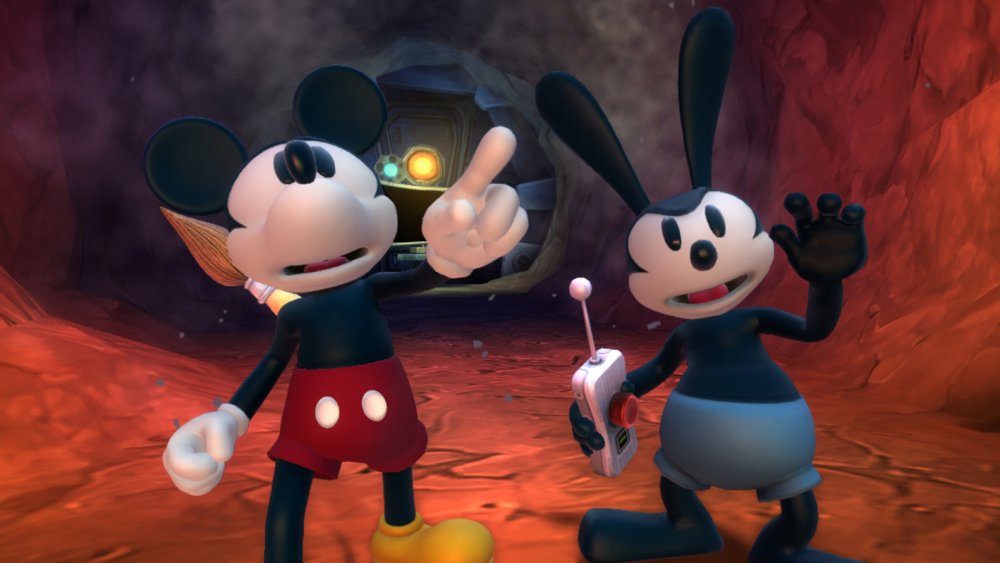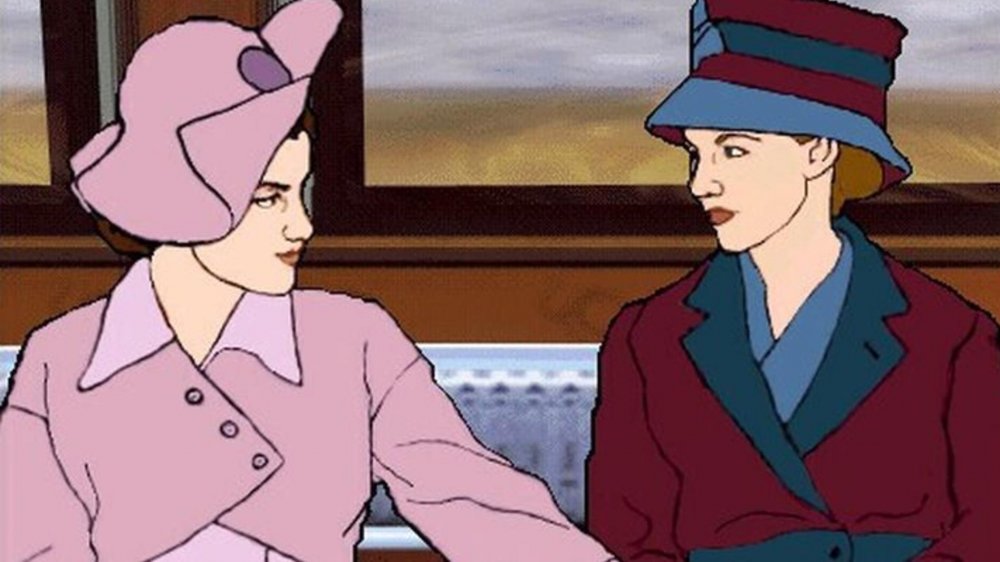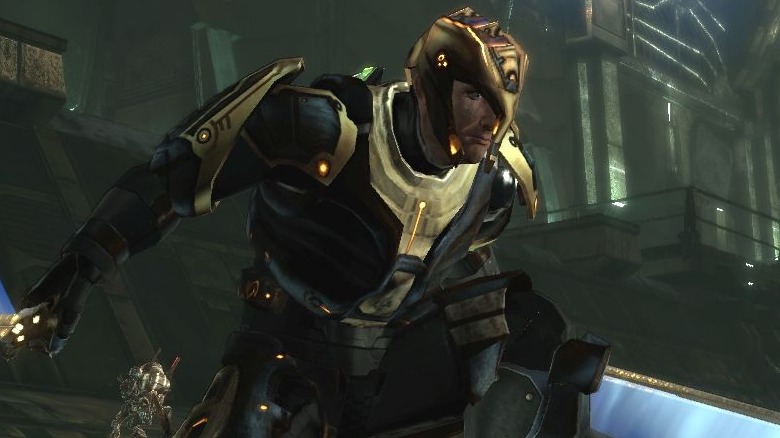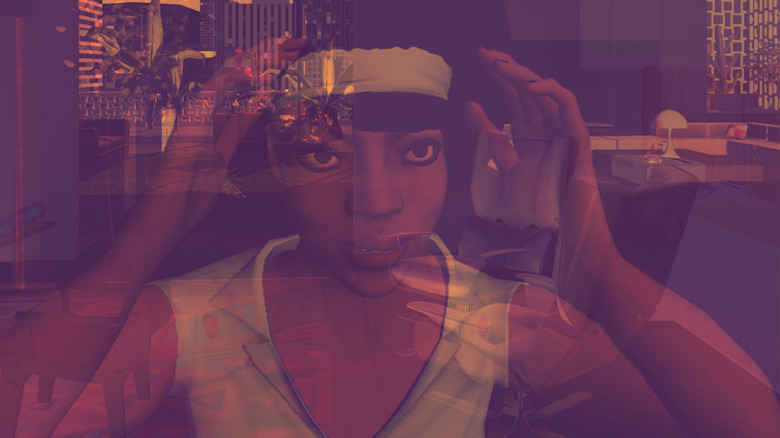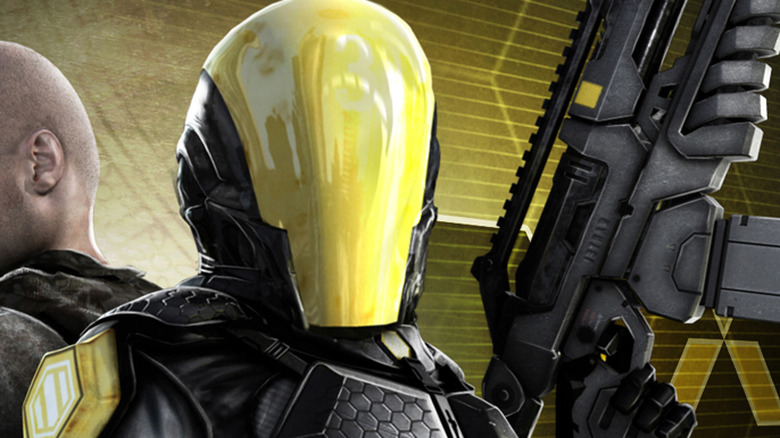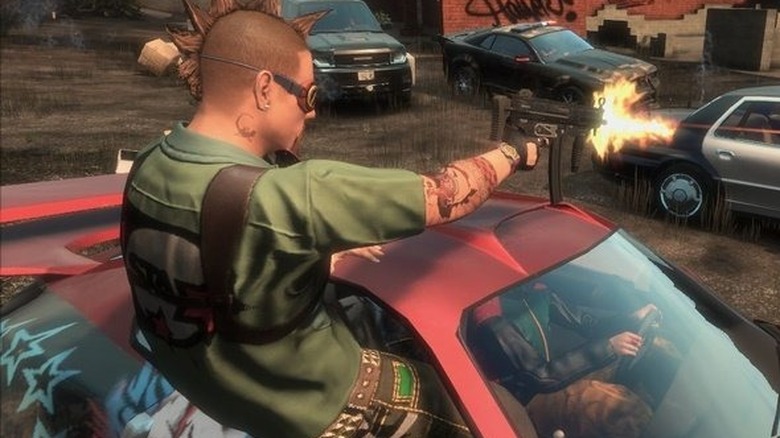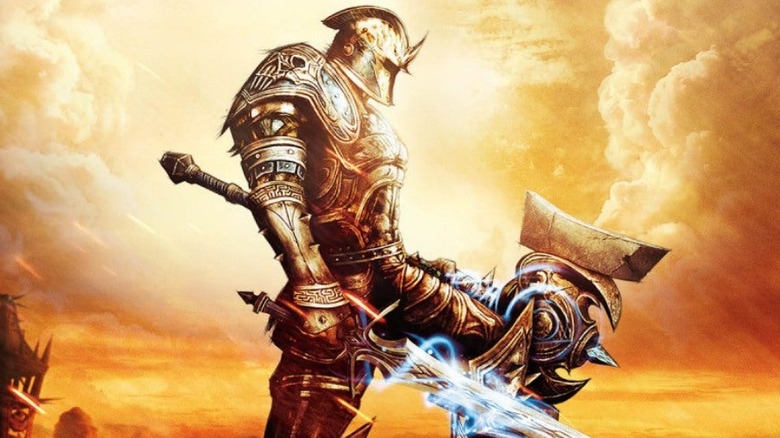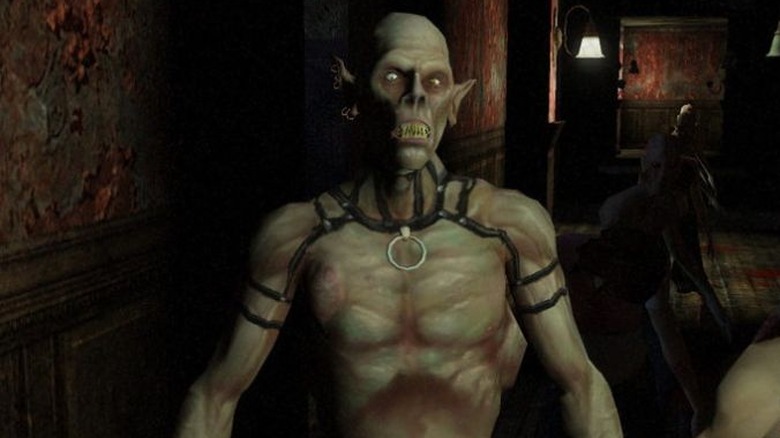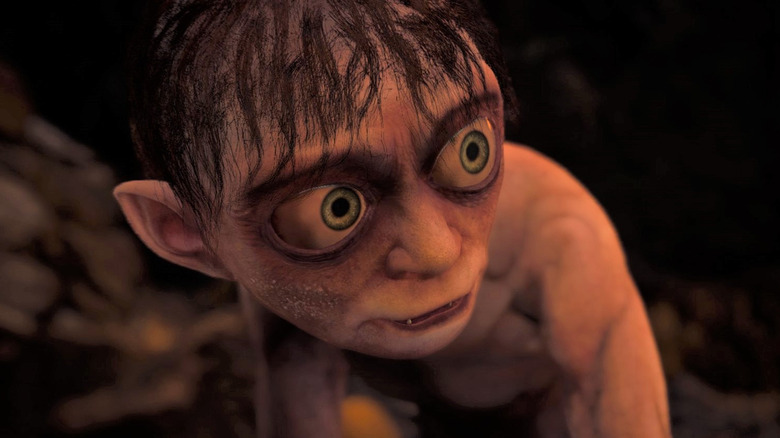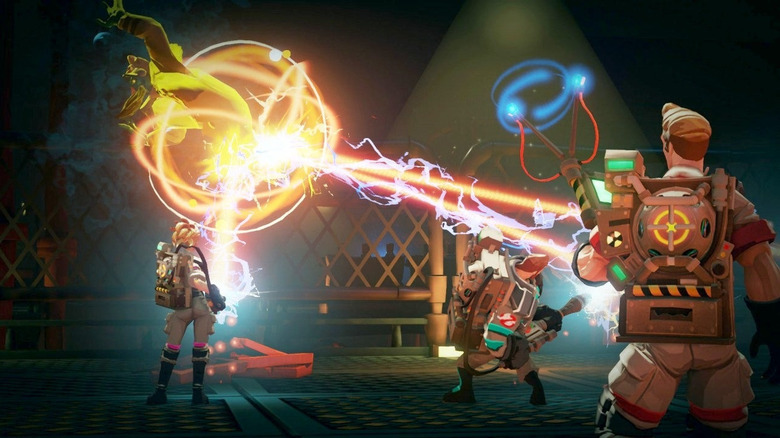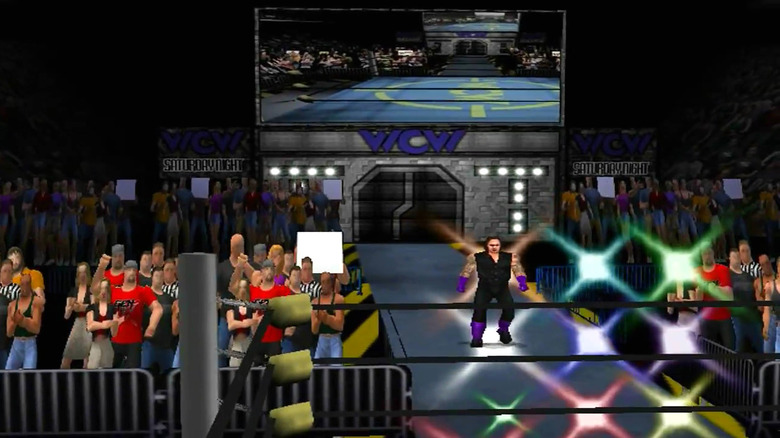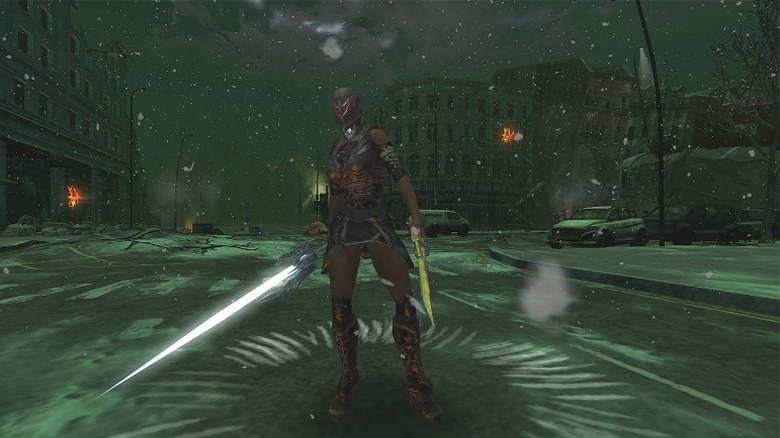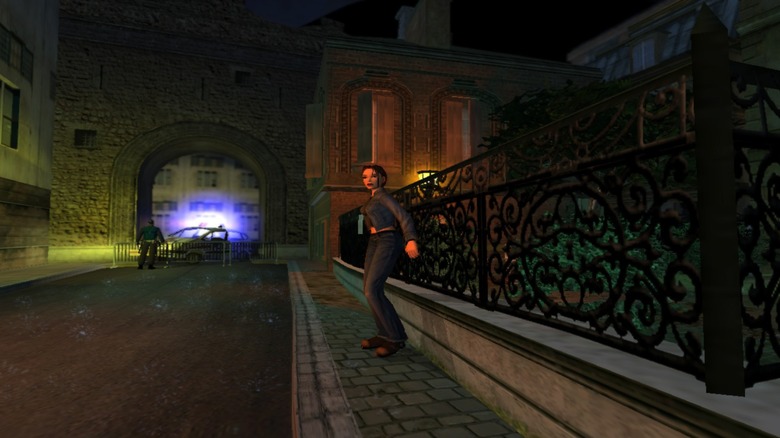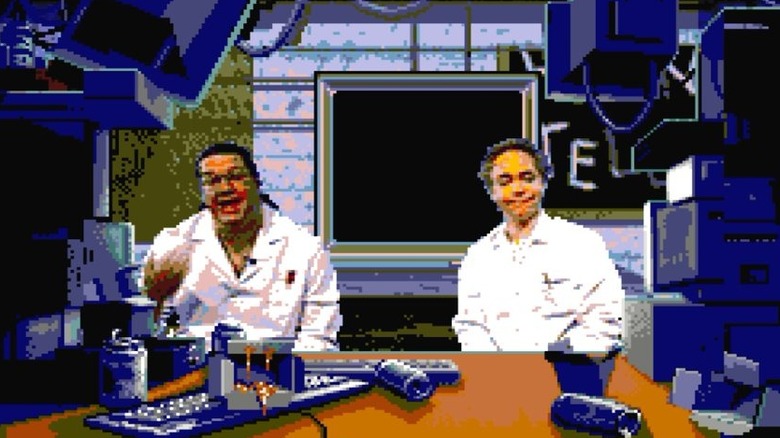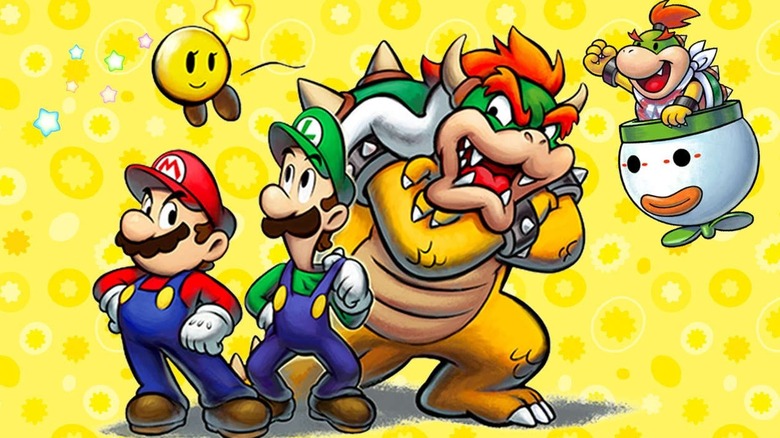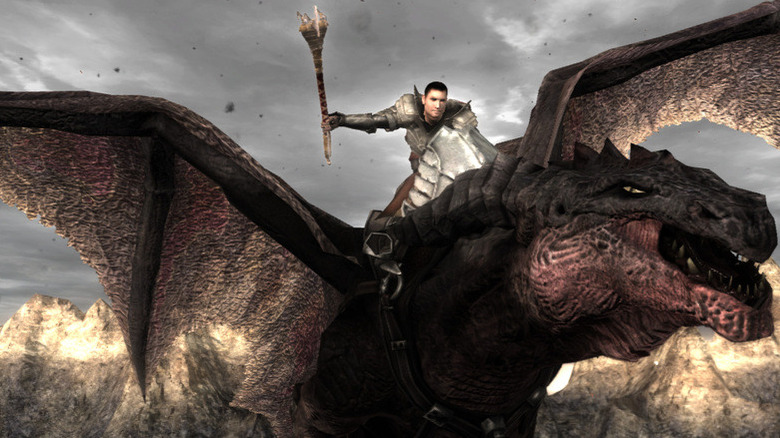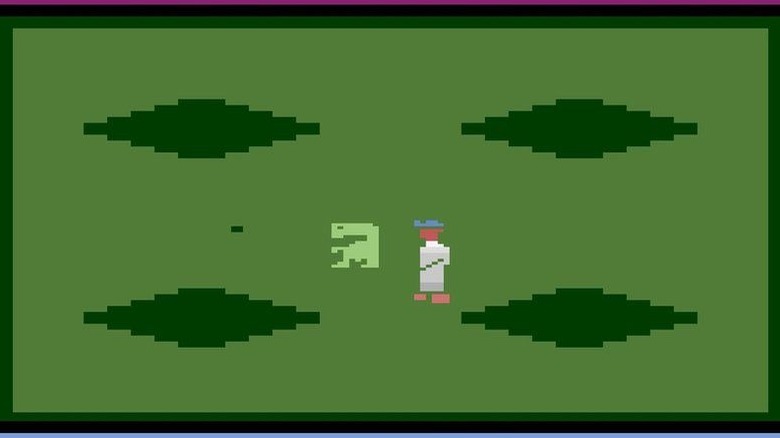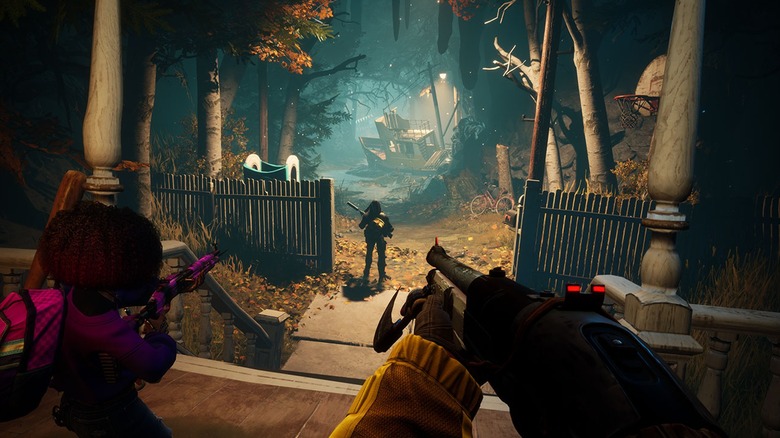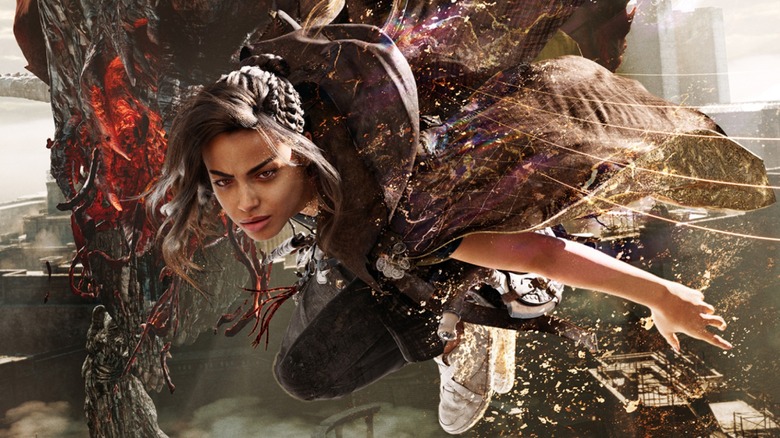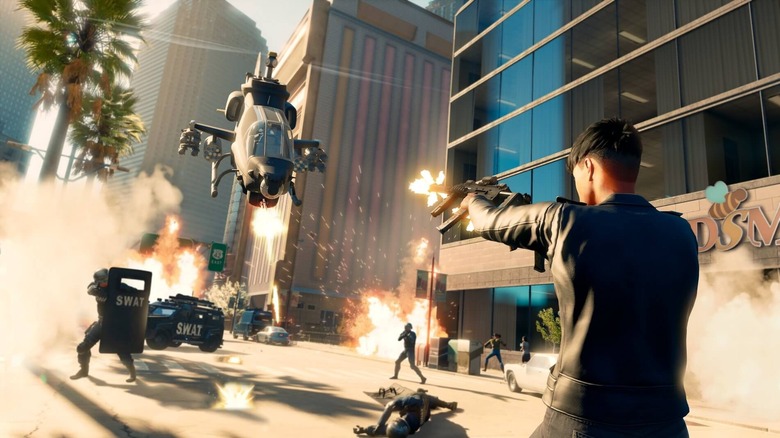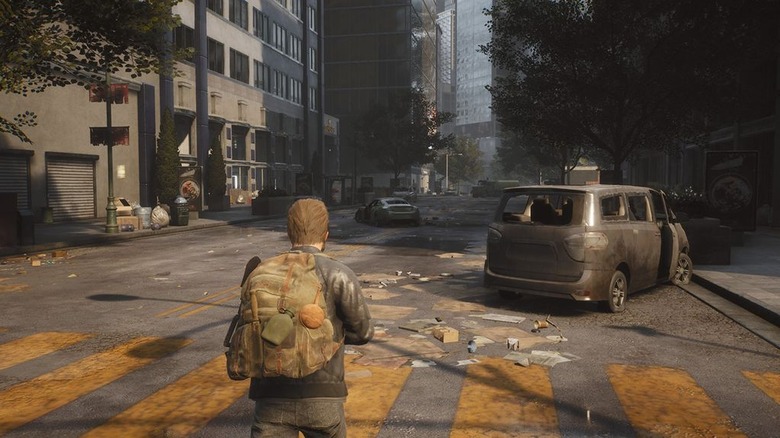Video Game Flops That Bankrupted Studios
If there's one thing that gaming fans have learned over the years, it's that it can sometimes be impossible to determine what will and won't be successful. Sometimes expected flops turn out to be huge hits. Other times, it seems like nothing could have saved a particular game or console from crashing hard. But for every overlooked gem or overrated hit, there's a game out there that just didn't sell enough to meet expectations. And unfortunately, in those instances, someone pays the price.
It can be especially difficult for a developer to recover after a game underperforms. The failure of one game can lead to a lack of funding or enthusiasm for the project that is meant to follow. There have even been times when a game has flopped so spectacularly that it's spelled the end of the development house that made it. Here are a few examples of video game flops that bankrupted studios.
Epic Mickey 2 (Junction Point Studios)
The "Epic Mickey" franchise was an interesting oddity in that it was a darker take on the Disney universe from the mind of "Deus Ex" creator Warren Spector. That was such a weird pairing alone that a decent number of people bought the first game. However, interest seemingly faded by the time the sequel arrived. "Epic Mickey 2" was a dismal failure, with decidedly mixed reviews and lackluster sales that didn't come close to the success of the first installment. In the wake of the game's poor retail numbers, Disney reportedly gave employees of developer Junction Point two months off from work. Shortly thereafter, it was confirmed that Disney had decided to close Junction Point Studios entirely.
In a bummer of a postscript, it appears that the closure of Junction Point and the failure of the "Epic Mickey" franchise also put an end to plans for two spin-offs. One was titled "Epic Disney Racers," which would have seen tons of Disney characters battling it out in a "Mario Kart"-style racing game. The other was an "Epic Mickey"-style game starring Donald Duck.
The Last Express (Brøderbund Software/Smoking Car Productions)
"The Last Express" was an interesting game. Created by "Prince of Persia" mastermind Jordan Mechner, "The Last Express" featured an interesting rotoscoped style of animation and told the story of a murder mystery on the Orient Express. This production from Brøderbund Software and Smoking Car Productions had such a classically intriguing concept that it's hard to believe it failed as badly as it did.
Sadly, this is due to the fact that Brøderbund's marketing staff left the company mere weeks before the game was released. This resulted in a non-existent marketing campaign, meaning that nobody knew this game that had taken four long years to make was even out. The game sold so poorly that Brøderbund was forced to sell its assets to The Learning Company, which allowed the game to fall out of print. "The Last Express" ended up being the only game produced by Smoking Car Productions, which folded after this game's failure.
Although the game was briefly rereleased by Interplay a few years later, that version also quickly went out of print.
Too Human (Silicon Knights)
Science fiction action game "Too Human" was a genuinely fascinating flop, but many of the most interesting aspects of its failure have little to do with the game itself. The game cost an absurd amount of money and took years to complete, but was met with low sales figures. However, it's what happened next that truly sealed the fate of its developer, Silicon Knights.
Following the failure of "Too Human," Silicon Knights took publisher Epic Games to court. Silicon Knights alleged that Epic had withheld necessary funds from the production, which in turn led to the underwhelming final product. This led to a counter-suit from Epic Games. The ensuing investigation into the game's production ended up backfiring on Silicon Knights in a spectacular fashion. The judge ruled that not only was Epic innocent of the charges, but it was also discovered that Silicon Knights had apparently stolen several lines of code from Epic for several of its games. This led to an order for Silicon Knights to recall and destroy copies of "Too Human." It also halted production on a few other Silicon Knights titles. Not long after, Silicon Knights went under.
Sunset (Tale of Tales)
Set during a violent revolution in South America, Tale of Tales' "Sunset" was an interesting take on the adventure game genre. It was also the beneficiary of a wildly successful Kickstarter campaign. Sadly, the general public did not seem to have the same passion or interest in Sunset as the folks who donated to the Kickstarter did. The game ended up receiving mixed reviews and only sold around 4,000 units total — a number that included the copies given to Kickstarter backers.
Having spent more money on the game than it had raised and being unable to recoup those costs through sales, Tale of Tales had to close shop. For what it's worth, the game's creators did their best to maintain positive and hopeful attitude following the closure of their studio. In a blog post detailing the end of Tale of Tales, studio founders Michaël Samyn and Auriea Harvey expressed a willingness to move forward, albeit outside of the gaming industry. They wrote, "Creativity still burns wildly in our hearts but we don't think we will be making videogames after this. And if we do, definitely not commercial ones."
Haze (Free Radical)
"Haze" seemed to have had the odds stacked against it. In the months leading up to its release, the game was being hyped up as "the 'Halo' killer." In other words, it had big shoes to fill before it was even completed. Even worse, as former director Steve Ellis told Engadget, the team making "Haze" was constantly under pressure to add new features to the game by publisher Ubisoft. The game saw a series of delays, as well as a bizarre marketing campaign that essentially spoiled major aspects of the plot.
The game was released to poor sales and savage reviews. "Haze" was seen as a disappointment, particularly after all of the promises being made about how it could change the gaming landscape. After losing a ton of money in the development of "Haze," Free Radical was barely hanging on. Following the dissolution of Free Radical's contract with LucasArts (for whom the company was originally going to develop "Star Wars: Battlefront 3"), the company was forced to close.
Blur (Bizarre Creations)
Developed by Bizarre Creations and published by Activision, "Blur" was a racing game with realistic graphics and arcade-style gameplay. It played like the bonkers love child of "Forza" and "Mario Kart," so it seemed like a sure-fire hit. "Blur" received pretty decent reviews, but saw sales that fell well below what Activision had hoped. Following the game's disappointing retail numbers, Activision put Bizarre Creations' staff on temporary leave while the publisher reportedly tried to find a buyer for the developer. Unfortunately, the studio was ultimately closed. The closure of Bizarre Creations also led to the cancellation of a pretty great-looking "Blur" sequel, which would have incorporated new weather mechanics and power-ups.
A few months after the closure of Bizarre Creations, some of the former studio heads were very candid about their disputes with Activision. In a piece published in Edge (via GamesRadar), it was claimed the publisher interfered with just about every aspect of production. Former Bizarre Creations Managing Director Martyn Crudely said that this partnership with Activision negatively affected the team's morale, which in turn led to a compromised final product.
Def Jam Rapstar (4mm Games)
"Def Jam Rapstar" was an interesting title, combining aspects of karaoke and rhythm games into one weird little package. It also managed to garner positive reviews from critics and the game's sales weren't that bad, either. So what went wrong?
Well, unfortunately for a company that made a game featuring dozens of popular songs, developer 4mm Games had not properly secured the rights to said songs. This led to EMI filing a lawsuit that totaled around $8.1 million. This issue was further complicated by the fact that several of the songs featured samples and guest tracks from other artists, which added up to even more of a legal headache. In the midst of the lawsuit, the decision was made to let go of 4mm's employees so that they could find other projects. 4mm founder Jamie King summed up the premature ending of his studio by telling GamesIndustry.biz, "We have not got any new funding and obviously we need to resolve everything with 'Rapstar.' And we've also got to eat."
APB (Realtime Worlds)
It cannot be overstated just how much of a flop "APB: All Points Bulletin" was. "APB" was an ambitious "GTA"-style MMO that predated "Grand Theft Auto Online." The game was in production for about five years and reportedly cost over $100 million to produce. In other words, it had to be huge or developer Realtime Worlds was in big trouble. Following a series of delays, the game was released to mediocre reviews. However, "APB" was also subject to a controversy over the review embargo enforced by Realtime Worlds. In a move that was heavily criticized at a time, Realtime asked that critics wait until a week after the game's release to publish their reviews.
In the end, it just didn't sell well enough to recoup the money put into it. Less than six weeks after the game's release, the developer filed for bankruptcy and let go of most of its employees. Less than three months after the release of "All Points Bulletin," Realtime Worlds announced that the game's servers would be shut down and that it would be discontinuing support for the game. Luckily for fans, the game was eventually rescued and relaunched by GamersFirst as "APB: Reloaded."
Kingdoms of Amalur: Reckoning (38 Studios)
Fantasy RPG "Kingdoms of Amalur: Reckoning" was the only game published by the ill-fated 38 Studios. During the development of the title, production was funded through an investment from the state of Rhode Island (no, really). While the game sold relatively well, it was not nearly enough to cover the cost of the game. As Rhode Island governor Lincoln Chafee told Joystiq (via ShackNews), the game ultimately lost "tens of millions of dollars."
38 Studios announced that it had gone bankrupt and had laid off its staff shortly after the release of the game. As if this weren't messy enough, a federal investigation was launched in 2016 due to accusations of fraud. It has been suggested that the agency and the bank that loaned 38 Studios the money for its next project willfully shorted the developer, resulting in its dissolution. THQ Nordic ultimately purchased the rights to the property and released a remaster of the original game under the delightful title of "Kingdoms of Amalur: Re-Reckoning," which likewise received mixed reviews.
Vampire: The Masquerade - Bloodlines (Troika Games)
"Vampire: The Masquerade – Bloodlines" deserved better, as did the developer that made it, Troika Games. "Bloodlines" was an ambitious game, but it was unfortunately released in an incomplete form. Even worse, due to cutbacks at Troika, the remaining staff were unable to patch all of the game's problems. Also, to add insult to injury, "Bloodlines" came out on the exact same day as "Half-Life 2," with little in the way of marketing. As "Bloodlines" lead writer Brian Mitsoda described to Eurogamer, "It was dumped on the market at the worst possible time — most people didn't even know we were out. Both fans and the Troika devs are always going to wonder what the game could have been like with another six months [of work]."
Following the colossal failure of "Bloodlines," Troika Games couldn't secure funding for any further projects. The developer closed its doors for good very soon after the game's release. However, the game became regarded as a cult classic. The fledgling vampire franchise is supposedly due to rise from the dead in the form of an upcoming sequel, which appears to be stuck in development hell.
The Lord of the Rings: Gollum (Daedalic Entertainment)
"The Lord of the Rings" is such a beloved franchise that it has reached just about every form of media. There are the original novels, the massively successful movie adaptations by Peter Jackson, and plenty of successful video games like "Shadow of Mordor," "Battle for Middle-Earth," and "The Lord of the Rings Online." This made it all the more disappointing for fans when "The Lord of the Rings: Gollum" was released in a poor state.
Focusing on everyone's favorite corrupted hobbit, it was positioned to show players a new side of the iconic character earlier than fans ever saw before. The character is an odd choice to follow for an entire game, but that's the least of the game's issues. Upon release, "Gollum" was lambasted by critics for tons of bugs, crashes, and technical issues. Even when the game runs, the stealth action gameplay just isn't very fun and the story struggles to keep even dedicated franchise fans invested.
The title's problems were so severe that the developers at Daedelic Entertainment released a public apology for the game's state at launch. The game was a flop, and shortly after launch, Polygon reported that Daedelic Entertainment would cease developing its own games and go back to solely publishing.
Ghostbusters (FireForge Games)
Video game tie-ins for popular movie releases used to be a common sight in the video game industry, with everything from "Bill & Ted's Excellent Adventure" to "Wayne's World" getting video games to try and capitalize on their popularity. While some tie-in titles are truly great, many have turned out to be cheap cash-ins, and the practice of giving everything a tie-in isn't as popular as it once was. This made the release of the tie-in game for 2016's "Ghostbusters" film all the more surprising. Unfortunately, the game's release also ended up providing a great reminder for why this practice has largely been left behind.
Developed by FireForge Games, "Ghostbusters (2016)" is a top-down co-op game that replaces the movie's protagonists with mostly new characters (a weird move for a movie tie-in). The game has been considered to be the worst game released under the "Ghostbusters" name, due to its uninspired gameplay, dull bosses, and a complete lack of the humor that the franchise is known for. It went on to be dubbed as the worst game of 2016 by Metacritic. Less than a week after its release, FireForge Games declared bankruptcy.
Showdown: Legends of Wrestling (Acclaim Studios Austin)
The "Legends of Wrestling" series struggled to find much purchase with fans of professional wrestling fans, but none of its three games were as big of a disaster as 2004's "Showdown: Legends of Wrestling." Developed by Acclaim Studios Austin, the game boasts an impressive roster of wrestlers that includes legends like The Ultimate Warrior and Randy Savage. A stellar roster didn't do much to help the game, which was lambasted upon its release. Critical reviews cited clunky controls that make moving around the ring feel awful, a litany of bugs, technical issues like frequent crashes and soft-locks, sloppy AI, and a repetitive commentary system as proof that this game was a failure.
These technical issues — along with a physical booklet that was missing sections and advertised commentary from Jerry Lawler being omitted from the final product — made the game feel like a rushed cash grab. Acclaim Studios Austin shut down shortly after the game's release, canceling two other projects in the works. "Showdown: Legends of Wrestling" was also the last game released in North America by parent company Acclaim Entertainment, which declared bankruptcy and closed the same year.
SimCity (Maxis Emeryville)
"SimCity" is a classic franchise that allows players to build a town of their own, then slowly expand and improve upon it until it becomes a sprawling metropolis. The series began in 1989 and enjoyed multiple sequels, then finally a full-on reboot in 2013. Developed by Maxis Emeryville, the primary studio belonging to the original creators of the series, the reboot aimed to provide better visuals than the series had previous attempted, all while making the game more accessible to newcomers and adding more options for experienced fans.
Despite being primarily a solo gaming experience, EA insisted that the developers program the game to require players to always be online while playing "SimCity." The decision angered some fans, but the problem was greatly exacerbated when the game launched and was plagued by server issues. Because of this, it was difficult for players to get into the game at all. When they did, they were frequently disconnected. Players eventually abandoned the game in droves. The disastrous launch proved fatal for the game, not to mention Maxis Emeryville as a whole. In early 2015, EA revealed to Polygon that it had closed the studio, relocating its employees to other positions within the company.
Hellgate: London (Flagship Studios)
"Hellgate: London" was the first game from Flagship Studios, and it seemed to have a lot going for it in the months leading up to its release. Created by former "Diablo" devs, it took players to a dystopian future London that's been invaded by demonic forces. It offered players six playable classes to choose from, a randomized loot system, a single-player story mode, online co-op, and more.
Sadly, the game received a tepid reaction from players when it launched, with criticism aimed at its repetitive quest system and divisive combat. A later patch also caused frustration when it deleted players' characters. Flagship ran into further problems when it rolled out a subscription model for the game that was roundly rejected by players. Even fans who were still on board found themselves unsure of what was included in the subscription and what could be accessed by players who didn't pay. Ultimately, Flagship was unable to find consistent funding to sustain the game and had to close its doors. "Hellgate: London" was purchased by Korean publisher Hanbitsoft, which redeveloped the game and eventually published it to a mixed response.
Tomb Raider: The Angel of Darkness (Core Design)
It is difficult to overstate just how massive an impact "Tomb Raider" had on the video game industry. The first title was a rousing success and guaranteed that the studio behind it, Core Design, would have plenty of sequels to work on. Publisher Eidos Interactive eventually wanted the developers to make the game an annual franchise. To make this a reality, Core Design split its developers in two groups, with one team constantly working on new "Tomb Raider" games.
This road eventually led Core Design to developing "Tomb Raider: The Angel of Darkness," which would be the end of the studio entirely. Released in 2003, the game was an almost universal critical failure. It was panned for its increased emphasis on stealth gameplay, poorly implemented controls, frequent frame dips, and poor AI. The negatives proved enough to overshadow its more positively received elements, such as its darker story and a more character-driven narrative delivered by a solid new cast of voice actors.
The failure of the game — which Core chalked up to Eidos forcing the team to put out an unfinished game on a tight schedule — led to Eidos Interactive taking the IP away from Core Design and giving it to Crystal Dynamics. Members of the Core team left shortly thereafter to create their own studio. Meanwhile, the rest of the company's assets were absorbed by another publisher, effectively ending Core Design as it gamers knew it. It was a sad end for a studio behind one of the most influential video game franchises ever, but the series went on to find further success at its new home.
Star Trek, Rise of the Robots, and Penn & Teller (Absolute Entertainment)
For the first chunk of its existence, Absolute Entertainment was better known as a publisher of video games, rather than a developer. The company released some true cult classics in the 8-bit era, with a few of its notable titles being the original "A Boy and His Blob" and "Star Trek: The Next Generation" for the NES. Absolute moved into developing games in the early 90s, but its last few titles did so poorly that it didn't survive the Genesis/SNES era of gaming. 1994's "Star Trek Generations: Beyond the Nexus" received terrible reviews from critics, while its involvement with notorious flop "Rise of the Robots" didn't help matters. In order to recoup some of its losses, Absolute Entertainment sold back its publishing rights for "Rise of the Robots." This effort proved futile.
The company's funds gradually ran out, and Absolute finally declared bankruptcy in 1995, leaving a game starring Penn and Teller unreleased. Though the developers were unable to find an alternative publisher for "Penn & Teller's Smoke and Mirrors," the game was eventually rediscovered and uploaded on the internet in the early 2000s, reminding gamers everywhere that the 90s were a weird time.
Mario & Luigi: Bowser's Inside Story Bowser Jr.'s Journey (Alpha Dream)
Believe it or not, putting Mario in a video game is not always a surefire route to success. A few of the lovable plumber's games have been outright flops, with weird outings on the Philips CD-i and the 64DD being a few notable examples of "Mario" titles that just didn't catch on. "Bowser's Inside Story" for the 3DS was one such flop, and it almost singlehandedly ended the studio that made it.
Alpha Dream is a name that Nintendo fans probably recognize, as the studio developed the "Mario & Luigi" spin-off series, as well as a handful of excruciatingly adorable "Hamtaro" games. Kicking off with "Mario & Luigi: Superstar Saga," this sub-franchise followed the titular brothers through colorful RPG adventures, offering a refreshing break from the core series' gameplay. "Superstar Saga" was a smash hit, but a later installment in this same series was the breaking point for Alpha Dream.
"Mario & Luigi: Bowser's Inside Story" is often pointed to as the best game in the "Mario & Luigi" series, so Nintendo decided to celebrate the title's tenth anniversary by commissioning a remake. Unfortunately, the resulting game, "Mario & Luigi: Bowser's Inside Story + Bowser Jr.'s Journey" was released on the Nintendo 3DS handheld — nearly two years into the Nintendo Switch's life cycle. Though generally liked by critics, the remake of "Bowser's Inside Story" ended up being one of the worst-selling entries in the entire "Mario" franchise. Alpha Dream limped along for another year before going out of business, its last title being "Mario & Sonic at the Olympic Games Tokyo 2020."
Lair (Factor 5)
"Lair" did not kill Factor 5 on its own, but the failure of the much-anticipated action/fantasy title was definitely a contributor to its downfall. Launched in 2007, "Lair" was at the center of a number of controversies. Critics slammed the game for its awkward motion control scheme, which members of development say was forced upon the team by Sony. The working relationship between Factor 5 and Sony soured as a result, but the real blow to the game's public image came when Sony sent a "Lair Reviewer's Guide" to websites that had already published reviews of the game. This guide essentially attempted to coach reviewers on how to play the game "properly," urging journalists to "Open your mind and your hands for something very different!"
The gambit did not pay off, and "Lair" was ultimately a bomb. In the aftermath, Factor 5 parted ways with Sony and attempted several projects with other publishers. The studio finally seemed to luck out with a Superman game that was to be published by Brash Entertainment. Unfortunately, Brash soon closed down and left Factor 5 without financial backing. By mid-2009, the developer had gone under. Factor 5 has since made a comeback, but "Lair" remains a cautionary tale, being the first in a series of dominoes that spelled doom for the studio.
E.T. the Extra-Terrestrial (Atari)
"E.T. the Extra-Terrestrial" for the Atari 2600 is one of the most infamous video games of all time, a title that is nearly synonymous with the word "flop." Developed in less than two months in order to capitalize on the success of Steven Spielberg's landmark film, "E.T." Is also often cited as one of the worst games ever made. In late 1982, however, Atari was so sure that brand recognition would carry the game to sales success that the company produced way too many "E.T." cartridges.
The game was a massive flop, to the point where Atari ended up disposing of hundreds of thousands of cartridges in a Texas landfill. Though the company would eventually recover from this debacle, Atari never again held the same dominion over the gaming industry that it enjoyed in the 1980s. The failure of "E.T." put a significant financial strain on Atari, and is seen by many as one of the events that precipitated the video game market crash of 1983. In the words of E.T. himself, "Ouch."
Redfall
During the build-up to release, "Redfall" seemed poised to be the next big co-op horror shooter, joining the ranks of games like "Left 4 Dead." Arkane Austin's looter shooter started to create hype after showing off its quirky character designs and supernatural enemies, but gamers were sorely disappointed by the final product that released in May 2023. Rather than the vibrant and addicting game they were expecting, players were met with a sloppy, buggy mess that didn't live up to the hype. Following the awful critical reception, the sales of "Redfall" were far lower than both Arkane Austin and Microsoft expected. From here, Arkane Austin was placed in a precarious position.
This all came crashing down in May 2024, around a year after the release of "Redfall." Microsoft cut back some of its studios to reprioritize its focus on more popular (and profitable) properties. Arkane Austin was one of the studios to get the axe, putting a final nail in the "Redfall" coffin. Before the cut, the company was working on new updates for "Redfall," but Microsoft instead ended up offering refunds for those who preordered the upcoming DLC. In the end, it seems that Microsoft chose to cut its losses over taking a chance on a failing game. Arkane Austin pushed out one more update for "Redfall" to fix some lingering bugs, then closed its doors.
Forspoken (Luminous Studios)
Following the release of "Final Fantasy 15," a group of employees of Square Enix came together to form a new company, Luminous Studios. While still fairly new and looking to prove itself, Luminous excitedly took on the role of developing a new IP for Square Enix. Designed to utilize the graphical capabilities of the PS5 and high-end PCs, "Forspoken" was an opportunity to put Luminous Studios on the map. However, early trailers for "Forspoken" drew jeers for the dialogue and seemingly generic fantasy setting, and when the game was finally released in January 2024, it received mostly lukewarm reviews. While some critics went to bat for its innovative magical parkour gameplay, most found "Forspoken" to be surprisingly one-note in terms of both story and quest design. "Forspoken" sales numbers were likewise underwhelming, particularly for a AAA next-gen title.
This poor performance is one of the main factors that led to Luminous Studios' eventual merger with Square Enix and the end of the company. Even gamers who didn't love "Forspoken" have expressed sadness at this development. Even though "Forspoken" is not the debut Luminous hoped for, the talented studio no doubt could have gone on to do great things as a standalone developer.
Saints Row (2022)
"Saints Row" has always been a more interesting franchise than some might assume at first glance. While many gamers view it as nothing more than a "GTA" clone, others love the series' over-the-top mentality, as well as the comedic and zany niche it has carved out in the crime/RPG genre. However, the series is no stranger to missteps, especially in the case of 2022's soft reboot of the series, simply titled "Saints Row." Developed by franchise veterans Volition and following the traditional "Saints Row" story of building up your own gang in a crime-run city, the new "Saints Row" aimed to take the series back to its roots of being a drama with comedic elements, rather than a pure comedy. However, critics found the writing to be a bit dated on release, particularly in its use of tired slang and pop culture references. Additionally, reviews noted that the story and gameplay felt largely uninspired, not to mention hampered by performance issues.
"Saints Row" ultimately did not meet the financial or critical expectations set by Volition's parent company, Embracer Group, which announced plans to merge Volition with Gearbox Entertainment. The developer was ultimately shuttered a year later during an extensive restructure at Embracer Group. Many gamers were sad to see a company with such a long history bow out with a final game like "Saints Row."
The Day Before
Developed by Fntastic, "The Day Before" was set to be a long-running survival extraction shooter game in which players traverse a post-apocalyptic city overrun by zombies. This sounds like a recipe for success, particularly due to how popular other extraction shooters like "Escape From Tarkov" have been with Steam players. In fact, prior to release, "The Day Before" was actually the most-wishlisted game on Steam. However, "The Day Before" suffered upon release from a litany of issues, including but not limited to: plagiarism accusations, technical issues, and extremely negative critical reception. After its early access release in 2023, "The Day Before" quickly became one of the most poorly reviewed games of all time on Steam. Players found the gameplay to be either uninspired and boring, or else completely unplayable due to server issues. It didn't help that the game barely resembled the impressive trailers that preceded the launch.
"The Day Before" didn't even come close to meeting sales expectations, particularly with players demanding refunds in droves. Only four days after the game was released, the game was removed from storefronts, and Fntastic was forced to close its doors. Servers for the game actually stayed live for a month after the closure, but "The Day Before" is now completely dead.


